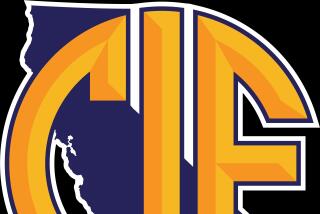Stuck With a Poor Education When Pro Dreams Evaporate
- Share via
Summer is the customary time for university presidents to try yet again to suggest substantial changes to college sports, particularly football and basketball.
All too often, there is much discussion but little action. This year, however, some significant reforms of academic standards and college sports may be in the offing.
Here is the tragic flaw of Division I football and basketball programs: Too often we recruit men and women who, though great athletes, find it difficult to succeed academically.
At the end of their college careers--when their dreams of professional success are all too inevitably gone--such players often feel used up and then sent on their way with little education and even less hope for the future.
The patterns and structures of college athletics are driven by all kinds of motives, many of them good, some of them no reasons for pride.
I will confess that at my university, where graduation rates for student athletes are significantly higher than the nationwide percentages, there are nonetheless athletic programs about which we are embarrassed with respect to the graduation rates.
All of us must ask whether the system of college athletics reflects with integrity our academic missions.
Unfortunately, there are too many instances where otherwise reputable universities have graduation rates for some sports in the teens or single digits. There are even a few institutions that have national championship programs in sports where the graduation rate is zero.
Not much will change unless the universities, meaning the presidents and their boards of trustees, establish and publish reliable measures of academic success (or failure) in programs and then set up a system of incentives and disincentives to reward universities for positive efforts and punish those that perpetuate the current, misguided system.
We must stop the almost annual occurrence of seeing championship teams filled with great athletes who do not attend class, are not making any progress toward a legitimate academic degree and are not, in any meaningful way, engaged in the rigors of higher education.
The days when universities reap the huge benefits of athletic success without fulfilling the mission of educational opportunity must end.
There are proposals now before the National Collegiate Athletic Assn. that would require prospective student athletes to enroll in more core courses in their high schools and universities to prove that they are meeting certain academic standards to remain eligible for play.
If approved, these proposals would ultimately lead to a system of incentives and disincentives affecting the number of scholarships available for a program and access to the post-season play and the accompanying dollars and prestige that brings.
Despite the recommendations of some pundits who dismiss the entire system as corrupt, we do not need to turn away completely from all forms of commercialism or reject television contracts.
Such a view is not only naive; it would diminish college athletics. Colleges were never designed to be, nor should they be, the minor leagues for professional programs. All our students, including our athletes, deserve the opportunity to work with integrity toward the intellectual and moral achievements historically characterized by a university diploma.
College sports programs do enormous good for student athletes and their universities. The athletes learn discipline, concentration, loyalty and commitment. Athletics binds the alumni with the institutions, and students enjoy a deep sense of belonging and exhilaration when their teams compete well and win.
Like anything else that gets twisted or manipulated, college athletics can also be the source of failure and even evil.
The system can and must be improved. It is too good for us to let it continue as it is now.
*
Robert B. Sloan Jr., president of Baylor University, chaired the Big 12 Conference board of directors from 2000 to earlier this year and is a spokesman for a group of six major college athletic conferences.
More to Read
Go beyond the scoreboard
Get the latest on L.A.'s teams in the daily Sports Report newsletter.
You may occasionally receive promotional content from the Los Angeles Times.










